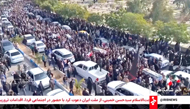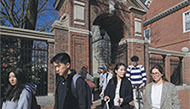Two Koreas to Hold Joint Exhibition on Japaese Colonial Rule
``At the invitation of the Academy of Social Sciences of North Korea, we visited Pyongyang on Nov. 28-Dec. 4, and neared agreement on the exhibition proving the illegitimacy of the annexation, which was planned and carried out by with force by the Japanese government,’’ said Lee Jong-hak, 73, one of the scholars who visited there.
``Once the North makes its final decision, further discussion over the details will take place, and it is likely that an exhibition in Seoul follow after the one held in Pyongyang,’’ he added.
Lee, an archivist, is the head of the private Sa-un Institute which conducts research Korean-Japan relations and the Japanese Colonial rule of Korea (1910-1945).
``For the trip to Pyongyang this time, we took about 350 documents and photos which prove that the annexation is not, as Japan insists, a valid agreement made signed between two countries,’’ Lee said, citing one Japanese government document as example.
The paper ``Japan-Korea Annexation Report,’’ records that prior to the annexation, a cavalry regiment, instead of the more forceful foot soldiers squadroon, was dispatched to the area near the Korean Emperor’s residence in Seoul, since they would ``suppress the primitive people (Koreans) more’’ with their looks.
Other papers he has prove that the Japanese authorities already took over the palaces by the time the annexation took place, having troops inside.
``Although the North Koreans’ view on the Japanese Colonial rule is not so different from ours, they lack the evidence, as most of the government offices were in Seoul and much record was destroyed during the Korean War (1950-1953), in the North’’ Lee said, adding that he hoped such records would help ``set the history straight.’’
He went on to say that he hoped the records would help the ongoing negotiations between North Korea and Japan on forming diplomatic relations.
Apology from the Japanese government, and a possible compensation for the colonial activities are said to be the major hurdles the two countries have to overcome before agreeing on ties.
South Korea, for its part, established diplomatic relations with Japan in 1965, receiving $182 million in compensation and $793 in loans as a result.
At the time, many criticized that Japan didn’t give an official apology, and that the compensation was not enough.
``I hope that the exhibition, if realized, will open the way for more academic exchanges between the two Koreas and set history straight,’’ Lee said.
ssm@koreatimes.co.kr
스마터리빙
more [ 건강]
[ 건강]이제 혈관 건강도 챙기자!
[현대해운]우리 눈에 보이지 않기 때문에 혈관 건강을 챙기는 것은 결코 쉽지 않은데요. 여러분은 혈관 건강을 유지하기 위해 어떤 노력을 하시나요?
 [ 건강]
[ 건강]내 몸이 건강해지는 과일궁합
 [ 라이프]
[ 라이프]벌레야 물럿거라! 천연 해충제 만들기
 [ 건강]
[ 건강]혈압 낮추는데 좋은 식품
[현대해운]혈관 건강은 주로 노화가 진행되면서 지켜야 할 문제라고 인식되어 왔습니다. 최근 생활 패턴과 식생활의 변화로 혈관의 노화 진행이 빨라지고
사람·사람들
more
[한인단체 신년 인터뷰] KYCC 송정호 관장… “지역사회 위한 종합 서비스 강화”
LA 한인타운 대표 비영리단체 한인타운청소년회관(KYCC)의 송정호 관장은 “지금 우리가 하는 일은 커뮤니티 ‘니즈’가 있기 때문에 존재한다”…

[한인단체 신년 인터뷰] LA 평통 장병우 회장… “본연 역할로 한반도 평화 실질 기여”
민주평화통일자문회의 LA협의회(이하 LA 평통) 장병우 회장은 6일 본보와의 신년 인터뷰에서 붉은 말의 해인 병오년 새해를 맞아 신년 화두로 …
워싱턴주에 첫 한인 시의장
워싱턴주에서 첫 한인 시의회 의장이 탄생했다. 제이슨 문(한국명 문태원) 머킬티오 시의원이 새해 들어 시의장으로 선출되며 또 하나의 중책을 맡…
국회 방문단 대한인국민회 방문
윤후덕·이해식·김한규 의원과 조오섭 국회의장 비서실장 등 10여 명의 한국 국회방문단이 지난 5일 LA를 찾아 로즈데일 묘지와 국민회관 등 미…
[한인단체 신년 인터뷰] 명원식 파바월드 회장… …
“한인 차세대들이 바르게 자랄 수 있는 토대를 만드는 것이 제가 파바월드의 회장으로 존재하는 유일한 이유입니다”한인사회의 대표적 청소년 봉사 …
많이 본 기사
- 트럼프 “이민자 시민권도 박탈한다” 1
- 또또 반전.. “1년간 법카 1억 넘게 쓰고, 합의금 5억 요구” 박나래 前 매니저 ‘새 녹취록’, 진실은
- 이란시위 사망자 6천명설…트럼프, 협상·군사개입 저울질
- 尹 구형할 내란 결심공판 다시 시작…최종 ‘마라톤 변론’ 예고
- ‘정권교체 대신 고쳐쓰기’…미국의 새로운 불량국가 대책될까
- 美국무, 온두라스 대통령 당선인과 회동…베네수 안정도 논의
- ‘불법명령 거부’ 촉구 의원, 軍계급강등 추진 美국방에 소송
- 방미 통상본부장, 美강경파 의원에 ‘韓플랫폼 규제 입법’ 설명
- 中에 무력했던 美, 핵심광물 공급망 강화하려 韓 등 우방 규합
- 미네소타주, ‘ICE 총격’ 반발해 소송… “연방의 침공, 중단돼야”
- 유럽의회, 이란 외교관 출입 전면 금지…EU, 추가 제재 고려
- 李대통령, 일본으로 출국…귀국 엿새 만에 다시 정상외교
- 트럼프 이민 규제에… ‘美입국 일본인 유학생’ 3천명 감소
- “미국에 집 2채” 전태풍, 놀고 먹는 남편..음주가무에 흡연까지 [동상이몽2]
- 金총리 “사이비 이단, 척결할 사회악…통일교·신천지 철저수사”
- 韓, 올해 초등 1학년 30만명도 안된다…초중고 전체는 500만명 붕괴
- “집값보다 무서운 유지비”… 올해도 재산세·보험료↑
- 트럼프 압박에 파월 ‘발끈’…사상초유 대통령-연준의장 정면충돌
- 트럼프 “이란과 거래하는 국가, 대미 거래시 25% 관세 부과”
- ‘케데헌’, 골든글로브 2관왕 차지...제83회 시상식서 애니메이션 및 ‘골든’ 주제가상 영광
- “이란 시위로 648명 사망…6천명 넘게 숨졌을 가능성”
- ‘좀비(zombie)체제’가 무너질 … 2
- ‘침대변론’에 미뤄진 尹 내란혐의 구형 나온다…오늘 결심공판
- “귀화 시민권 박탈 기준 검토” 파장 1
- 벨뷰통합한국학교, 봄학기 등록 시작...특별활동반 확대 개설해 18개로…종이접기•난타•합창반 신설
- LA 길거리 매춘 단속 대폭 강화… “고객도 처벌”
- 뉴욕증시, 파월 수사 둘러싼 경계감 속 저가 매수…강세 마감
- VA 페어팩스 세금 폭탄에 기업·주민‘탈출 러시’우려
- H-1B 비자 등 최대 3천달러 육박… 1
- 대학 편입 고민 중이라면… 명확한 이유 있어야
- 워싱턴주 물가 비싸도 가족부양하기 좋다...월렛허브 연례 조사서 전국 50개주중 13위로 지난해와 동일
- 사상초유 美대통령-연준의장 정면충돌…법무부의 자충수 되나
- [조지 F. 윌 칼럼] 트럼프의 무면허 괴물 사냥
- 페더럴웨이 통합한국학교 봄학기 등록을...4세 이상부터 성인까지… 2월 7일부터 15주 수업
- 메타, 사장에 트럼프 행정부 출신 영입…트럼프 “훌륭한 선택”
- 에어프레미아, 연중 최대 할인
- ‘케데헌’, 美골든글로브 애니메이션상·주제가상 2관왕
- ‘ICE 총격’ 주말 미 전역 항의 … 1
- ‘코요테 주의’… 남가주 주택가서 급증
- ‘PSG 희망’ 이강인, 드디어 ‘나홀로 훈련’ 돌입... ‘파리 더비’는 결장 유력→랑스 원정 복귀하나
- 돈로 독트린
- 지병주 서북미연합회 이사장 모친상...곽정례씨 향년 90세로...천국환송예배 15일 WA 밴쿠버서
- “항상, 뉴진스가.. “다니엘, 눈물로 전한 ‘퇴출’ 심경
- 美당국자 “北사이버 불법활동, 美최우선과제…작년 20억 달러 탈취”
- “최대 6천불 추가 공제돼요”
- 인앤아웃서 100달러 위폐 12개 매장 사용 2명 체포
- “美-대만 무역협상 곧 타결…관세 15%로↓·TSMC 美투자 확대”
- 내 개인정보 모두 다크웹에?… 지금 당장 해야 할 일들
- “이정후, 빨리 우익수로 옮겨라!” SF 담당 베테랑 기자, 구단 ‘외야 플랜 실패’ 맹비판
- 새 VA 주지사는 의원을 좋아해
1/5지식톡

-
 한국 안경을 무료 배송으로 받아보실…
0
한국 안경을 무료 배송으로 받아보실…
0안녕하세요. 서울 안암동에 위치한 ‘보고싶다 안경원’입니다.저희는 다년간 한국 고객분들께 착용감 좋은 안경테와 한국안경브랜드,고압축 도수 렌즈를 합리적인 가격에 제공해온 안경 전문점입니다.이번에 해외 배송이 가능해…
-
 미 육군 사관학교 West Poin…
0
미 육군 사관학교 West Poin…
0https://youtu.be/SxD8cEhNV6Q연락처:wpkapca@gmail.comJohn Choi: 714-716-6414West Point 합격증을 받으셨나요?미 육군사관학교 West Point 학부모 모…
-
 ☝️해외에서도 가능한 한국어 선생님…
0
☝️해외에서도 가능한 한국어 선생님…
0이 영상 하나면 충분합니다!♥️상담신청문의♥️☝️ 문의 폭주로 '선착순 상담'만 진행합니다.☎️ : 02-6213-9094✨카카오톡ID : @GOODEDU77 (@골뱅이 꼭 붙여주셔야합니다…
-
 테슬라 자동차 시트커버 장착
0
테슬라 자동차 시트커버 장착
0테슬라 시트커버, 사놓고 아직 못 씌우셨죠?장착이 생각보다 쉽지 않습니다.20년 경력 전문가에게 맡기세요 — 깔끔하고 딱 맞게 장착해드립니다!장착비용:앞좌석: $40뒷좌석: $60앞·뒷좌석 …
-
 식당용 부탄가스
0
식당용 부탄가스
0식당용 부탄가스 홀세일 합니다 로스앤젤레스 다운타운 픽업 가능 안녕 하세요?강아지 & 고양이 모든 애완동물 / 반려동물 식품 & 모든 애완동물/반려동물 관련 제품들 전문적으로 홀세일/취급하는 회사 입니다 100% …
케이타운 1번가
오피니언
 옥세철 논설위원
옥세철 논설위원‘좀비(zombie)체제’가 무너질 때…

돈로 독트린
 조지 F·윌 워싱턴포스트 칼럼니스트
조지 F·윌 워싱턴포스트 칼럼니스트 [조지 F. 윌 칼럼] 트럼프의 무면허 괴물 사냥
 전지은 수필가
전지은 수필가 승리의 여신은 언제까지?
 신경립 / 서울경제 논설위원
신경립 / 서울경제 논설위원[만화경] 그린란드의 하얀 금

무분별 이민 단속이 불러온 비극

무면허 건축업자 피해 근절돼야
 메건 매카들 워싱턴포스트 칼럼니스트
메건 매카들 워싱턴포스트 칼럼니스트 [메건 매카들 칼럼] 마두로는 체포했지만… 베네수엘라 석유 생산 회복은?
 김미선 서북미문인협회 회장시인
김미선 서북미문인협회 회장시인 [한국춘추] 새해, 북방의 한국인을 생각하며
1/3지사별 뉴스

‘ICE 총격’ 주말 미 전역 항의 시위
미네소타주 미니애폴리스에서 연방 이민세관단속국(ICE) 요원의 총격에 30대 시민권자 여성이 사망한 사건에 항의하는 대규모 시위가 주말동안 뉴…
“귀화 시민권 박탈 기준 검토” 파장

새 VA 주지사는 의원을 좋아해
민주당 아비가일 스팬버거(Abigail Spanberger) 버지니아 주지사 당선자는 오는 17일 취임을 앞두고 내각 인선을 거의 마무리한 상…
VA 페어팩스 세금 폭탄에 기업·주민‘탈출 러시’우려

트럼프 압박에 파월 ‘발끈’…사상초유 대통령-연준의장 정면충돌
트럼프 대통령과 중앙은행 수장이 정면 충돌하는 사상 초유의 상황이 전개되고 있다.제롬 파월 연방준비제도(Fed·연준) 의장이 자신을 겨냥한 도…
살림으로 뿌리내리다- 테이크루트 안미정 대표의 요리 이야기 (9)



















































.png)


댓글 안에 당신의 성숙함도 담아 주세요.
'오늘의 한마디'는 기사에 대하여 자신의 생각을 말하고 남의 생각을 들으며 서로 다양한 의견을 나누는 공간입니다. 그러나 간혹 불건전한 내용을 올리시는 분들이 계셔서 건전한 인터넷문화 정착을 위해 아래와 같은 운영원칙을 적용합니다.
자체 모니터링을 통해 아래에 해당하는 내용이 포함된 댓글이 발견되면 예고없이 삭제 조치를 하겠습니다.
불건전한 댓글을 올리거나, 이름에 비속어 및 상대방의 불쾌감을 주는 단어를 사용, 유명인 또는 특정 일반인을 사칭하는 경우 이용에 대한 차단 제재를 받을 수 있습니다. 차단될 경우, 일주일간 댓글을 달수 없게 됩니다.
명예훼손, 개인정보 유출, 욕설 등 법률에 위반되는 댓글은 관계 법령에 의거 민형사상 처벌을 받을 수 있으니 이용에 주의를 부탁드립니다.
Close
x